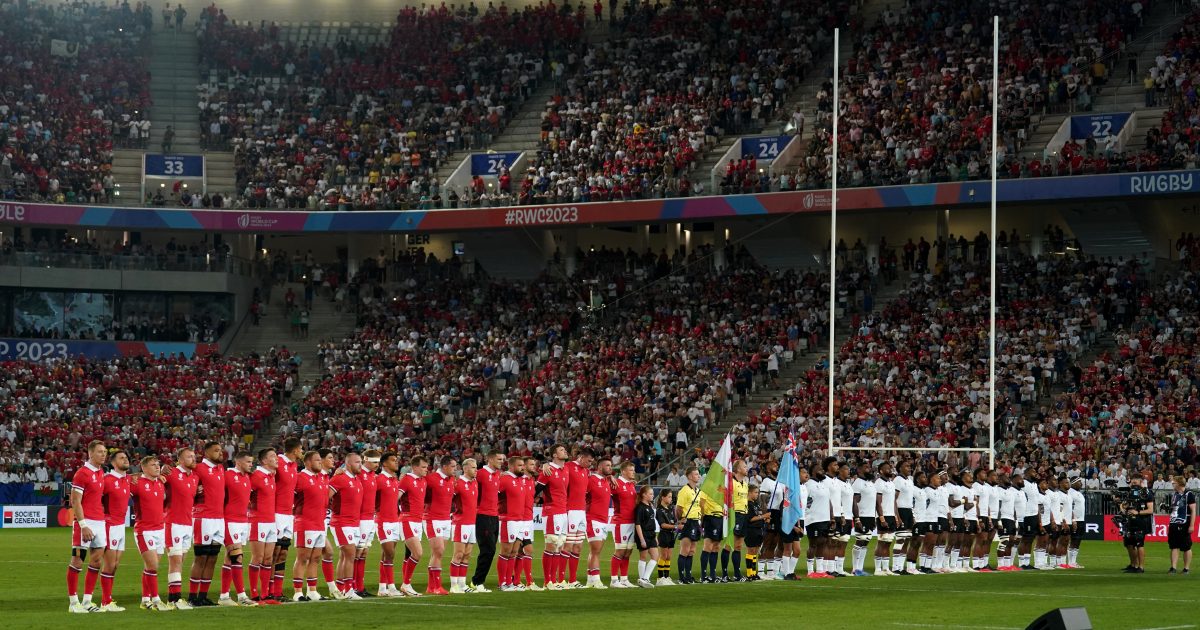Rugby World Cup step in after anthem criticism

Rugby World Cup organisers have announced plans to record new renditions of the national anthems of competing countries after those used over the opening weekend were heavily criticised.
Choirs involving 7,000 schoolchildren from diverse backgrounds sung each country’s anthem without accompanying music, with the recordings played in the stadiums.
However, the general consensus was the versions used did not hit the mark, with players and supporters singing out of sync as a result.
Tournament organisers have accepted the criticism and proposed that new, more simplified adaptations would be used that retain the voices of the children.
“We’ve clearly understood and received the feedback from fans and teams as well and we all know the anthems are a central part of the experience of the fans, the players and the teamsm so we have definitely understood that feedback,” said tournament director Michel Poussau, speaking at a media briefing on Wednesday.
“We understand that it hasn’t worked as well as we hoped, which is why we are now working in partnership with France 2023 and our unions at new versions, which we hope will combine the best of both worlds. Basically where we can have anthems that will be closer to expectations from all, but will still have that touch from the kids who have been amazing and have been working very hard and deserve to be part of the anthems.
“That is what we have been working (on) and hopefully the new version will be approved by all unions.”
Poussau is confident early teething problems with fans gaining access to stadiums have been ironed out heading into the second weekend of the tournament.
There were chaotic scenes outside the Stade Velodrome in Marseille before England’s match against Argentina on Saturday night and thousands of ticket holders missed the start of the Pool D opener because of the limited number of entry points and turnstiles, insufficient staffing levels and extensive security checks.
There were similar issues ahead of Ireland’s match against Romania in Bordeaux the same day, although access appeared to be notably smoother at both venues the following day for matches between Scotland and South Africa in Marseille and Wales and Fiji in Bordeaux.
“It is very clear that not everything went well in the first weekend and that is not really a surprise to us. It’s always very complex to start,” said Poussau.
“But we are very confident in our capacity and our organising committee, who we are working hand in hand (with) to address these challenges and to find the relevant solutions.
“We are completely confident, but that doesn’t mean we are being complacent. We have our fans and our teams at heart and our ambition is always to deliver the best for them.
“We want to stop the frustration of some of our fans, for example not being able to make their way to the stadium in Marseille or Bordeaux as they should have been, but we are very confident this will be fixed over the weekend.
“There were challenges in Marseille and Bordeaux, but France 2023 has worked hard and in these two cases the second game was a lot better than the first one.
“I think we should thank France 2023 for this and the people on the ground who had a limited amount of time. They have tried to address the challenges and find solutions.”
There were also issues on the first weekend surrounding the supply of refreshments for supporters running dry.
“We have had a heatwave in September, which has never happened before, which had two major consequences,” said France 2023 chief executive Julien Collette.
“The fans drank a lot more. We thought we had sufficient supplies based on previous records, but those records were broken. For example, the previous record was 50,000 cups, and there we sold 90,000, well over any previous records.
“The second consequence is that the barrels have been difficult to keep refrigerated. It was not so much the supplies, but how cold the barrels were, which is why there were queues.
“We are working hard with our teams to improve the efficiency of the refrigeration and service. The consumption of water also broke records too.”



















































“The fans drank a lot more. We thought we had sufficient supplies based on previous records, but those records were broken. For example, the previous record was 50,000 cups, and there we sold 90,000, well over any previous records." Scotland's entry to RWC causes unforeseen effect on local beer supplies...